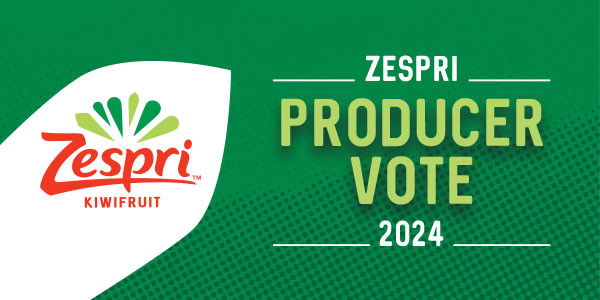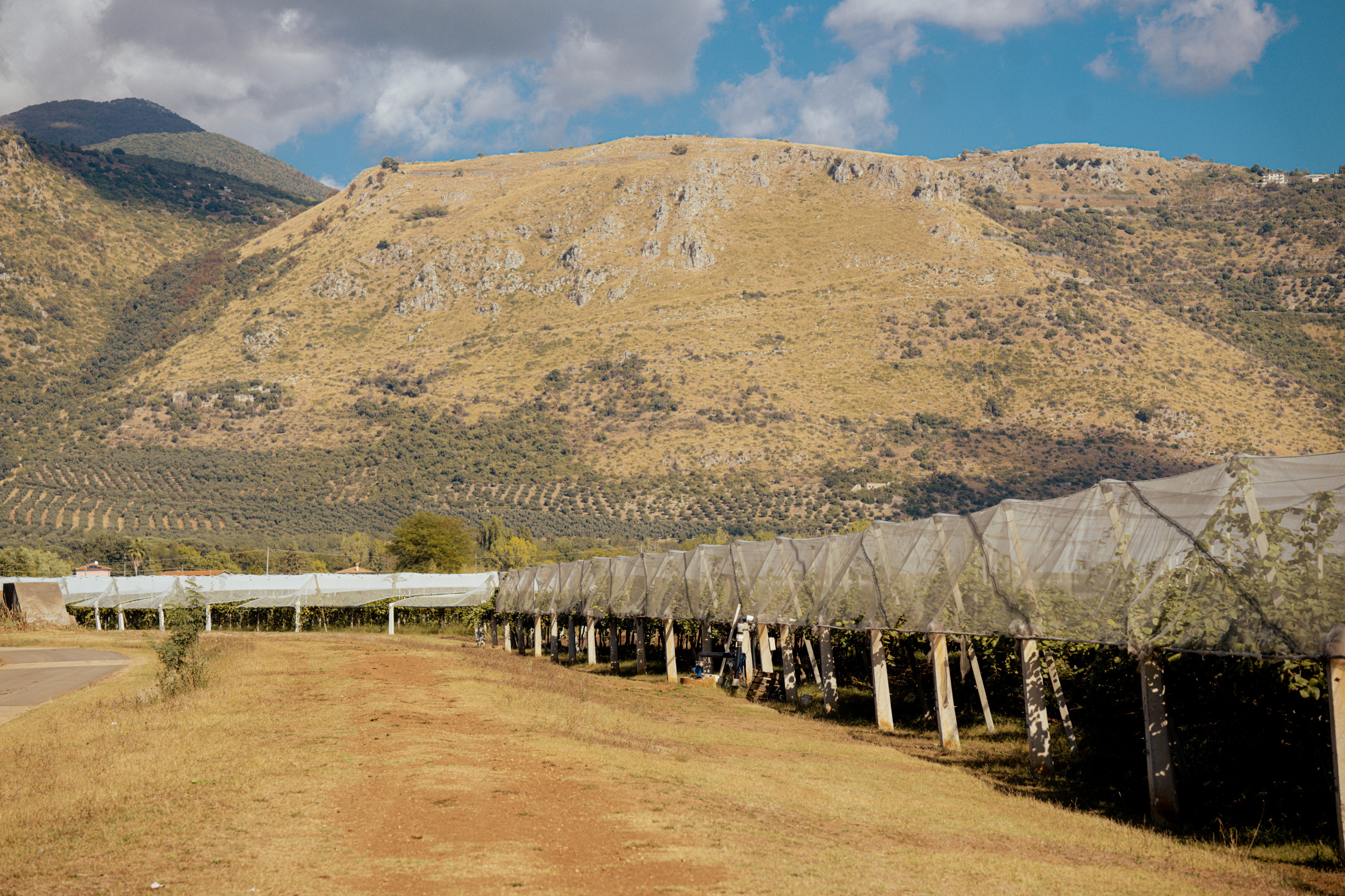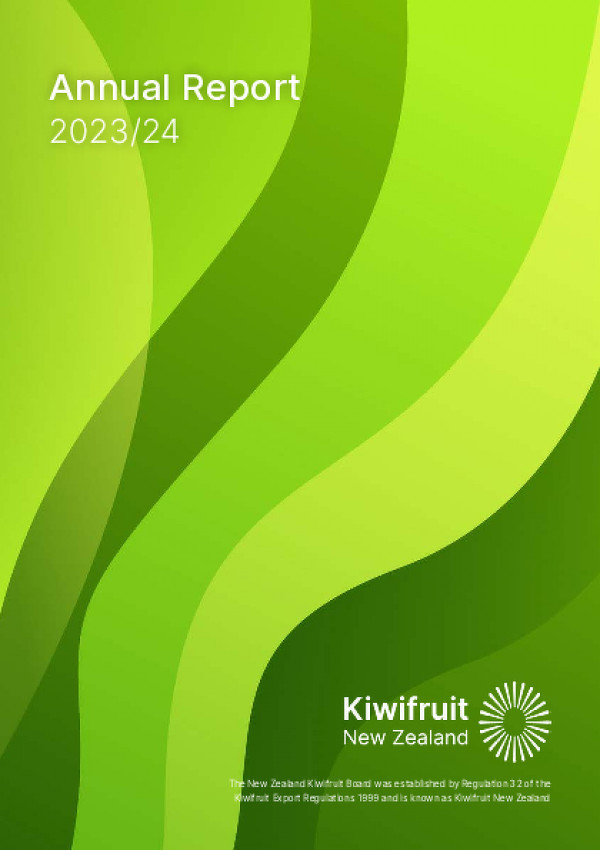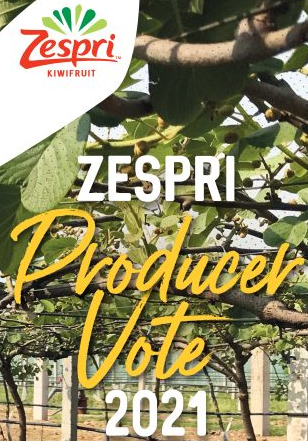Latest updates from the KNZ office.
Zespri has held a producer vote under Regulation 11 of the Kiwifruit Export Regulations 1999 ('Regulations') relating to the expansion of the ZGS programme to increase the planted hectares of Zespri SunGold kiwifruit by 420 hectares per year for six years in five designated countries. The voting for the producer vote took place from 11 November to 5 December 2024. The results have been confirmed by electionz.com and Zespri published the results on 10 December 2024 (see results below).
Under the Regulations, for Zespri to carry out any activity that is not core business, it must obtain "at least 75%" agreement by those producers who vote by both number voters, and by volume (weight) of production. Zespri obtained the required proportion of votes with 90.60% producer support, and 93.29% by volume of production.
KNZ will now update its monitoring plan for ZGS activity to incorporate the increase in hectares planted in the Northern Hemisphere and the commitments made by Zespri to New Zealand kiwifruit producers.

Newly appointed KNZ Chair - Samantha Sharif
The Chair of KNZ is appointed by The Minister of Agriculture for a term of three years.
On the 23rd October 2024, Samantha Sharif was appointed as the new Chair to the KNZ Board.
Samantha Sharif is a professional director with extensive global leadership experience in infrastructure, resources, safety critical industries, as well as investment and capital markets.
Having experience as a Board, and Board Committee Chair, Samantha is also a Chartered Fellow of the Institute of Directors and has experience as a CEO and practiced as a senior commercial lawyer, with post-graduate legal and finance qualifications.
The KNZ Board look forward to working alongside Samantha.
Please follow the link below to view Samantha’s bio.

Zespri has announced that it will undertake a producer vote on the extension of 12-month supply activities. Zespri’s voting pack will include an executive summary of KNZ’s report.
The report sets out KNZ’s role in relation to the producer vote and how it will monitor and enforce Regulation 11.
The full report can be viewed by clicking below.

Kristy McDonald KC has been Chair of the KNZ Board for nine years and completed her final three terms on 30th September 2024.
This nine-year period has seen major growth in the kiwifruit industry and the amendment of the Regulations in 2017 to reflect outcomes from the KISP process.
Under Kristy’s leadership KNZ has built strong processes and capacity to carry out its functions in a professional and independent manner. Kristy spoke at the Industry Dinner in August this year and her speech is reprinted below.
The KNZ Board would like to thank Kristy for her unstinting commitment and contribution to the kiwifruit industry and expects to announce the new Chair in early October.
Tēnā koutou Katou - Good evening
Thank you Nathan for generous words and flowers.
I have completed nine years as chair of KNZ and over that time I've worked with eleven KNZ directors and three chairs of Zespri. I have been very grateful for the support of all of our directors but particularly for the insight the industry directors have brought to the role.
I have greatly enjoyed my time with KNZ -working with such a dynamic and important industry.
I have learnt a great deal about Kiwifruit/ travelled to various markets and visited supermarkets around the world Even on my personal holidays I've been known to drag my long suffering husband around supermarkets taking endless photos of kiwifruit displays....
I'm pretty sure if you did an international survey and asked what a kiwi was- chances are the majority would say it was a round brown hairy fruit rather than a round brown hairy flightless bird. Such is Zespri's success.
As for my reflections on the role of the Regulator-
- it's really about independence and balance. I believe a strong independent regulator is fundamental to the success of the single desk exporter model- especially in a highly competitive world market where there are continued attempts to undermine the single desk.
There have times over the course of my tenure when being able to demonstrate, at an international level, that the dominant position Zespri enjoys comes with strong independent oversight, has been key to resisting attempts to undermine the single desk.
This is likely to become even more important in the future as key markets trend toward greater protectionism.
KNZ's role is a nuanced one, and strong regulatory oversight needs to be balanced with flexibility to ensure the industry continues to thrive: a strong but not a heavy hand has always been what we aim to achieve.
Industry confidence in the regulator's independence is critically important.
Thank you to my colleagues at Zespri and the KNZ team. Particularly our CE - Geoff Morgan.
Kiwifruit Industry Dinner
Zespri Head Office
21 August, 2024

KNZ became aware in December 2023 that Zespri was undertaking a Coolstore Update Project (Project) that targeted carbon emissions reductions in relation to refrigerant use in the post-harvest sector.
The Project included engaging an external agency to gather data on refrigerant gas inventory and historical leaks from each participating post-harvest supplier and report back to participants with an anonymised report including the data and options for upgrading systems. The intention was that the report would assist post-harvest suppliers applying jointly for government funding to assist decarbonisation.
The non-diversification rule in regulation 11 of the Kiwifruit Export Regulations 1999 (Regulations) prohibits Zespri from carrying out activities that are not core business or do not support core business unless a producer vote is taken giving Zespri approval to carry out the activity. Zespri did not undertake a producer vote because it considered the Project was core business.
KNZ advised Zespri of its concerns regarding the Project, and following receipt of this, Zespri advised that it had withdrawn from the Project and that post-harvest sustainability leaders had taken the lead.
The Board determined that the Project did not meet the definition of core business in the Regulations and gave Zespri notice of an investigation into whether Zespri had failed to comply with the non-diversification rule.
While a full assessment was unable to be undertaken in these circumstances, the Board considered it was likely the Project would have supported core business and therefore Zespri would not have been required to undertake a producer vote in accordance with regulation 11. This meant that the investigation did not find a breach of the non-diversification rule.
Zespri was reminded of the need for strict compliance with the prior notice rule in regulation 10A if there is any doubt as to whether an activity is core business. The Board recorded that Zespri’s processes for evaluating whether activities are core business are important for compliance with the Regulations and KNZ will continue to engage with Zespri to ensure compliance.
4 September, 2024
When nominations for the election of a Director of Kiwifruit New Zealand closed on Monday, August 5th 2024, only one nomination had been received, which was for Colin Olesen.
As there is only one nomination, an election will not be required.
Colin's third, three-year term on the KNZ Board will start on 1 October 2024.
I welcome Colin back to the KNZ Board and look forward to continuing to work with him.
Kristy McDonald ONZM KC
Chair

The 2023-24 KNZ Annual Report is now available.
This report covers KNZ's activities for the 2023-24 financial year, and also provides some additional information on the Monitoring, Zespri Global Supply and Zespri Core Business.
If you would like to receive a hard copy of our annual report, please contact [email protected] and one will be posted out.
To read our annual report, please follow the button below.

Regulation 15 of the Kiwifruit Export Regulations 1999 requires KNZ, to disclose publicly within three months after the end of each season;
1 the identity of each CM approval holder
2 the volume marketed by each approval holder
3 financial information to enable an assessment to be made, if the net returns for each arrangement were greater than if the arrangement had not been approved.
This information is contained in a report located below.

Regulation 40 of the Kiwifruit Export Regulations 1999, requires KNZ to prepare financial statements that comply with generally accepted accounting practice, have them audited by a qualified auditor, signed by the Board and disclose publicly, within three months after the end of the financial year.
KNZ has complied with this regulation and financial statements can be found below.
Kiwifruit New Zealand received a complaint in February 2024 questioning if Zespri's grades and size standards for RubyRed kiwifruit breached the non-discrimination rule.
Under Regulations 9 and 10 of the Kiwifruit Export Regulations 1999, Zespri must not unjustifiably discriminate among suppliers in respect of a decision on whether to purchase kiwifruit or the terms of the purchase contract, unless that discrimination is justified on commercial grounds.
The KNZ Board considered the complaint in accordance with the process laid out in the Export Authorisation, and the KNZ Board advised its findings to Zespri and the complainant on the 5th April 2024.
A copy of the redacted decision can be found below.
This decision helps clarify Zespri's ability to set its purchase terms for New Zealand grown kiwifruit as outlined in the Kiwifruit Export Regulations 1999 and the Export Authorisation.
Geoff Morgan
Chief Executive

Kiwifruit New Zealand received a complaint in May 2023 from Seeka Limited, that questioned whether Zespri had breached the non-discrimination rule by agreeing to a Service Level Agreement (SLA) with only one post-harvest supplier.
Under Regulations 9 and 10 of the Kiwifruit Export Regulations 1999, Zespri must not unjustifiably discriminate among suppliers in respect of a decision on whether to purchase kiwifruit or the terms of the purchase contract, unless that discrimination is justified on commercial grounds.
A KNZ committee was formed to consider the complaint in accordance with the process laid out in the Export Authorisation, and the KNZ Board reached its final decision, with orders, on 14 November 2023.
A copy of the redacted decision can be found here.
Geoff Morgan
Chief Executive
Regulations 33A and 33B require KNZ to prepare a statement of intent that relates to the next three-year period.
KNZ's latest statement of intent for 2023-2026 has now been finalised and can be found below.
Regulation 39(4) requires KNZ to publicly disclose a statement of how funding has been achieved for the previous three-year period.
The funding statement for 2020-2023 can also be found below.
Zespri has held a producer vote under Regulation 11 of the Kiwifruit Export Regulations 1999 ('Regulations') relating to the expansion of the ZGS programme to increase the planted hectares of Zespri Sungold kiwifruit and any new kiwifruit variety in overseas countries (excluding Chile and China). The voting for the producer vote took place from 28 July to 24 August 2022. The results have been confirmed by electionz.com and KPMG, and Zespri published the results on 1 September 2022 (see results link below).
Under the Regulations, for Zespri to carry out any activity that is not core business, it must obtain "at lease 75%" agreement by those producers who vote by both number voters, and by volume (weight) of production. Zespri has not obtained the required proportion of votes for this producer vote, therefore Zespri cannot carry out the proposed activities described in the two resolutions.
Zespri can continue to carry out the 12-month supply ZGS activities as approved in the 2019 Producer Vote and can continue its core business under the Regulations, which includes:
- the marketing of New Zealand-grown kiwifruit; and
- the market development for New Zealand-grown kiwifruit; and
- research and development relating to kiwifruit.

KNZ received a complaint from the Certified Organic Kiwifruit Growers Association (COKA) in respect of the decision made by Zespri to exclude Organic SunGold kiwifruit from the China market in the 2021 season. Under Regulations 9 and 10 of the Kiwifruit Export Regulations 1999, Zespri must not unjustifiably discriminate among suppliers in respect of a decision on whether to purchase kiwifruit or the terms of the purchase contract, unless that discrimination is justified on commercial grounds.
A KNZ committee was formed to consider the complaint and, in accordance with clause 6.1.3 of the Export Authorisation ('EA'), the committee decided to conduct a preliminary assessment to assess whether there were sufficient grounds to justify an investigation under the enforcement procedure in clause 6.2 of the EA. The committee considered the information provided in the context of the Regulatory framework and sent a letter dated 24 May 2022 advising Zespri of the preliminary assessment decision. A copy of the letter was provided to COKA and can be found below.
Zespri has held a producer vote under Regulation 11 of the Kiwifruit Export Regulations 1999 ('Regulations') relating to a one season commercial trial in China. The voting for the producer vote took place from 1 to 25 June. The results have been audited by KPMG and Zespri published the results on 2 July (see results below).
Under the Regulations, for Zespri to carry out any activity that is not core business it must obtain "at least 75%" agreement by those producers who vote by both number of voters, and by volume (weight) of production. Zespri has not obtained the required proportion of votes for this producer vote, therefore Zespri cannot carry out the proposed activities described in the two resolutions.
Zespri can continue to carry out its core business under the Regulations, which includes:
- the marketing of New Zealand-grown kiwifruit; and
- the market development for New Zealand-grown kiwifruit; and
- research and development relating to kiwifruit.
Zespri are holding a Producer Vote under Regulation 11 of the Kiwifruit Export Regulations 1999 (Regulations) asking kiwifruit growers to vote on an activity that is outside Zespri’s core business (as defined in the Regulations).
The proposed activity is a one season commercial trial where Zespri will purchase unauthorised Gold3 grown in China and market it under the Zespri brand.
The voting will be open from 31 May to 25 June 2021.
KNZ’s role is to monitor Zespri’s compliance with the Regulations. To ensure kiwifruit growers understand the Regulations relating to diversified activities, and to provide some background relating to this producer vote, KNZ have produced a brief report which is available below.
You will also find links to Zespri’s information brochures that will be emailed and posted to all kiwifruit growers.
Geoff Morgan
Chief Executive
4 May, 2021

Kiwifruit New Zealand monitors and enforces Zespri’s compliance with the mitigation measures in the Kiwifruit Export Regulations 1999. The Regulations prohibit Zespri from carrying out any activities that are not its core business, unless those activities ‘support core business’, as defined in regulation 10A, or are approved by a producer vote under regulation 11.
KNZ is required by regulation 33 to monitor and enforce Zespri’s compliance with regulations 10A and 11. The intent of these provisions is to establish the appropriate level of control by producers over Zespri’s engagement in activities that are not ‘core business’. It is important to note that KNZ’s role is not to itself make a decision about the desirability of an activity, or manage the risks undertaken by Zespri, or decide whether those risks are appropriate or whether the benefits of an activity outweigh the risks involved. Rather, KNZ’s role is to ensure that producer oversight is engaged where it ought to be.
On 28 October 2020 Zespri gave notice to KNZ under regulation 10A that it proposed to carry out an activity that was not core business, being a three- year trial of a commercial procurement model for Chinese-grown Gold3 kiwifruit, involving up to 1.95 million trays. Zespri’s view was that the proposed activity meets the definition of ‘supporting core business’, being that it is likely to enhance the performance of Zespri’s core business, and poses no more than a low risk (if any) to the interests of New Zealand producers.
The information initially provided by Zespri in its notification was not sufficient for KNZ to form a view on whether the notified activity ‘supports core business’, and KNZ engaged extensively with Zespri through November and December to obtain further and more detailed information to inform its assessment. The final tranche of information was received on 23 December 2020.
KNZ also consulted with NZKGI specifically on the identification of the potential risks to the interests of producers posed by the notified activity. NZKGI provided its input on 11 December 2020.
KNZ engaged Sapere Research Group to undertake a detailed analysis and provide advice on whether the notified activity met the definition of ‘supports core business’. Zespri facilitated engagement between Sapere and its own expert advisors and staff which has been a very useful process. KNZ also engaged a former New Zealand Ambassador to China, to work with Sapere. Sapere’s final report to the KNZ Board was received on 6 January 2021.
The KNZ Board met on 8 January 2021. After careful consideration of all the information a preliminary determination was made that the notified activity met the first leg of the Regulation 10A test, and was likely to enhance performance of Zespri’s core business. However, after considering the risks and the mitigation measures to reduce the risk, KNZ came to the conclusion that there were three areas of risk that posed more than a low risk to the interests of producers.
Therefore, KNZ’s preliminary decision was that the notified activity did not meet the definition of ‘supports core business’ under regulation 10A. If Zespri wished to proceed with the activity detailed in the Prior Notice it would need to hold a producer vote as detailed in Regulation 11.
A Draft Decision report setting out the reasons for this view was conveyed to Zespri for its comment on 11 January 2021.
Zespri did not provide a response to the Draft Decision. Instead, on 15 January 2021 Zespri wrote to KNZ stating that it wished to ‘withdraw’ its Prior Notice for a 3-year trial and would be providing a new Prior Notice in due course that would take into account KNZ’s position and risk assessment outlined in the Draft decision.
Notwithstanding that Zespri has taken that step, KNZ nevertheless considers that it is important for the transparent operation of the regulatory regime that producers and the public are informed of the process followed by KNZ, and its preliminary view that the notified activity did not meet the test under Regulation 10A.
If a future Prior Notice covers similar activities in China, as indicated by Zespri, then KNZ’s future assessment will draw on the work already completed.
Geoff Morgan
Chief Executive
25 January, 2021
Zespri has advised growers and the public that it is developing a plan to address the issue of its PVR “Gold3” being grown illegally in China.
The Kiwifruit Export Regulations 1999 have a clear definition of Zespri’s “core business”. The buying and selling of kiwifruit grown in China is not covered by that definition and therefore if Zespri wish to commercialise (i.e. purchase and sell) this fruit, then it needs to follow the steps set out in Regulation 10A – prior notice rule.
10A ZGL must inform Board before carrying out activities that support core business
(1) ZGL must inform the Board before carrying out any activities that are not the core business but do support the core business.
(2) For the purposes of this regulation and regulation 11, an activity supports the core business if—
(a) the activity is likely to enhance the performance of the core business;
and
(b) the activity poses no more than a low risk (if any) to the interests of producers.
(3) A consideration of the nature of any risk under subclause (2)(b) must—
(a) first take into account any measures that ZGL has put in place to mitigate the effects of any risk event; and
(b) then consider—
i. the likelihood of a risk event occurring; and
ii. the impact on the interests of producers if a risk event occurred.
(4) In subclause (3), risk event means an event identified as a risk to the interests of producers that is posed by the activity.
(5) In this regulation and regulation 11,—
activity includes, without limitation, the ownership or operation of an asset
risk means foreseeable risk
Zespri has now given KNZ a “Prior Notice” under Reg 10A detailing a commercial trial it wishes to undertake in China during 2021. KNZ is undertaking an independent assessment of this activity and will determine if it meets the definition of “supports the core business” as detailed in Reg 10A (2).
If KNZ considers the activities proposed in the notice do support Zespri’s core business, then Zespri can carry out those activities without further regulatory steps.
If KNZ considers that the activities proposed in the notice do not support Zespri’s core business, then Zespri cannot carry out those activities, unless it has been successful in a producer vote as outlined in Regulation 11.
KNZ will complete its assessment as soon as practicable.
Geoff Morgan
Chief Executive